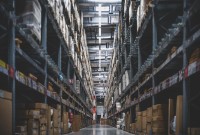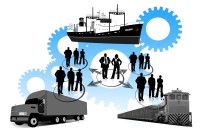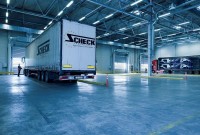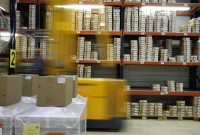- Home
- Business Processes
- Industry Knowledge
- Aerospace Industry
- Automotive Industry
- Banking Domain
- BFSI Industry
- Consumer/ FMCG Industry
- Chemicals Industry
- Engineering & Construction
- Energy Industry
- Education Domain
- Finance Domain
- Hospitality Domain
- Healthcare Industry
- Insurance Domain
- Retail Industry
- Travel and Tourism Domain
- Telecom Industry
- Leadership Skills
- eLearning
- Home
- Business Processes
- Warehouse Management
- Distribution Network Planning
Distribution Network Planning
To stay competitive in today’s tough market, the location of your warehouse is vital. To grow retail business need to offer to customers faster and affordable shipping time, which is dependent on the warehousing location as the location of the warehouse affects the transit time to ship orders to customers.
Distribution network planning determines how many warehouses or distribution centers a company requires to satisfy its customer base, as well as where those warehouses should be located.
Warehousing Location
To stay competitive in today’s tough market, the location of your warehouse is vital. To grow retail business need to offer to customers faster and affordable shipping time, which is dependent on the warehousing location as the location of the warehouse affects the transit time to ship orders to customers. Warehouse location affect the accessibility of business and its products to customers. The site and building need to meet the size, infrastructure, and capacity requirements of your retail business. When choosing your warehouse, also consider the volume of products and seasonal variations.
Some other considerations are:
- The number of products using the warehouse
- The type of demand for each product, how much it varies, average order size, and so on
- Physical features of the products, particularly size and weight
- Special storage conditions, such as climate control, packaging, and so on
- Target customer service level
- Lead times from suppliers and promised to customers
- Economies of scale
- Type of material handling equipment
- Layout of storage and related facilities.
Related Links
You May Also Like
-
Inventory is money, and hence businesses need to perform physical inventory counts periodically to make sure that their inventory records are accurate. The traditional approach to conducting inventory counts is to shut down a facility during a slow time of year to count everything, one item at a time. This process is slow, expensive, and (unfortunately) not very accurate.
-
One of the warehousing best practices that retailers like Walmart, Amazon, and Target have adopted is known as cross-docking. During this process the inbound products are unloaded at a distribution center and then sorted by destination, and eventually reloaded onto outbound trucks. In real parlance, the goods are not at all warehoused but just moved across the dock (hence the name).
-
Warehouse management and distribution logistics involve the physical warehouse where products are stored, as well as the receipt and movement of goods takes place. Warehouse management aims to control the storage and movement of products and materials within a warehouse. These operations include the receipting of inwards goods, tracking, stacking and stock movement through the warehouse.
-
When a customer wants a product that has been stored in the warehouse, the same need to be picked off the shelf (or off the floor) and get it ready for shipping. Depending on how big is the warehouse, picking can take a while. (Many distribution centers cover more than 1 million square feet.). Hence, warehouse order picking methods are an important aspect within any warehouse.
-
What is a Warehouse & why companies need them?
All organizations hold stocks. In virtually every supply chain, gaps exist between when something is produced and when a customer is ready to buy or receive it. Stocks occur at any point in the supply chain where the flow of materials is interrupted. This implies that products need to be stored during this period of gap.
-
When products arrive at a facility, there need to be a defined process to let them in. The process for accepting inventory when it arrives is called "Receiving". Any warehousing operation must be able to receive inventory or freight from trucks at loading docks and then stow them away in a storage location. Receiving often involves scheduling appointments for deliveries to occur, along with unloading the goods and performing a quality inspection.
-
Business Case of Multiple Warehouses
Adding extra warehouses to business provides many benefits such as reducing shipping costs, increasing storage capacity, and having warehouses for specific purposes to simplify overall warehouse management. Multiple warehouses allow you to organize your inventory in a way that helps your business be more effective.
-
Overview of Third-Party Logistics
Third-party logistics (abbreviated as 3PL, or TPL) is an organization's use of third-party businesses to outsource elements of its distribution, warehousing, and fulfillment services. A third-party logistics provider (3PL) is an asset-based or non-asset based company that manages one or more logistics processes or operations (typically, transportation or warehousing) for another company.
-
The Outbound process starts with routing the shipments. The Outbound execution process starts from the point when pick tasks are completed for an outbound shipment and ends at the point where the outbound packages are loaded into trailers. The Warehouse Outbound process includes managing and controlling outgoing materials starting from the download of orders through to the shipping of products from the warehouse.
-
Types of Inventory Count Processes
While dealing with lots of inventory in a warehouse, lots of things can go wrong. Shipments may not have the right number of units in them, or they could get damaged somewhere along the supply chain. Discrepancies in the stock may arise as part of every inventory control, and need to be corrected immediately after the inventory control procedure has been finished.
Explore Our Free Training Articles or
Sign Up to Start With Our eLearning Courses

About Us
Learning
© 2023 TechnoFunc, All Rights Reserved











